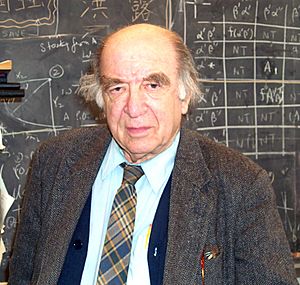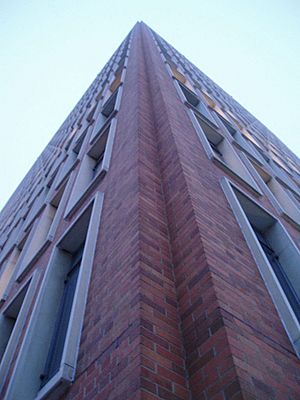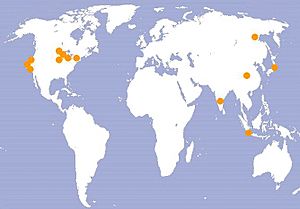Leonid Hurwicz facts for kids
Quick facts for kids
Leo Hurwicz
|
|
|---|---|
 |
|
| Born | August 21, 1917 |
| Died | June 24, 2008 (aged 90) |
| Nationality | |
| Awards | National Medal of Science (1990) |
Leonid Hurwicz (born August 21, 1917 – died June 24, 2008) was an American economist and mathematician. He is famous for winning the 2007 Nobel Prize in Economics.
Hurwicz came up with important ideas in economics called "incentive compatibility" and "mechanism design". These ideas help us understand how people and groups make choices. They also help explain how countries trade and work together economically.
Professor Hurwicz was a top economics professor at the University of Minnesota. He believed that game theory was very important. Game theory is about how people make choices when they interact with each other. Hurwicz shared the 2007 Nobel Memorial Prize in Economic Sciences with Eric Maskin and Roger Myerson. They won for their important work on mechanism design.
Contents
About Leonid Hurwicz's Life
Professor Hurwicz was born in Moscow, Russia. This was just a few months before a big change in Russia called the October Revolution. His family was Jewish and originally from Poland. They had moved to Russia to escape World War I.
Soon after Leonid was born, his family moved back to Warsaw, in Poland. Life was hard for Hurwicz and his family because they were Jewish. They faced difficulties from different groups. He became a refugee again when Adolf Hitler invaded Poland in 1939.
His parents and brother went to Russia. Later, they were sent to special camps. Hurwicz had to move to Switzerland, then to Portugal. Finally, in 1940, he moved to the United States. His family was able to join him there later.
In 1944, Leonid married Evelyn Jensen. She was studying economics at the University of Chicago. They lived in Minneapolis, Minnesota and had four children: Sarah, Michael, Ruth, and Maxim.
Hurwicz had many interests. He liked linguistics (the study of language), archaeology (the study of old things), biochemistry (the study of life's chemistry), and music. He even did research for meteorology (the study of weather). He was also involved in politics. In 1968, he was a delegate for the Democratic Party.
Professor Hurwicz died in Minneapolis, Minnesota, when he was 90 years old. He passed away due to kidney problems.
How Did Leonid Hurwicz Learn Economics?
Professor Hurwicz's father wanted him to study law. So, in 1938, Hurwicz earned a degree in law from Warsaw University. But he really enjoyed economics classes.
He went on to study economics at famous places like the London School of Economics. He also studied in Geneva, Switzerland. After moving to the United States, he continued to learn economics at Harvard University and the University of Chicago.
It's interesting that Professor Hurwicz never got a formal degree in economics. Yet, he won the Nobel Prize for economics in 2007! He once said, "Whatever economics I learned, I learned by listening and learning." This shows how much he learned on his own.
In the early 1940s, Hurwicz helped teach at the Massachusetts Institute of Technology. He also taught electronics to the U.S. Army Signal Corps during the war. From 1942 to 1944, he taught statistics at the University of Chicago. His teachers there were Jacob Marschak and Tjalling Koopmans.
Leonid Hurwicz's Teaching and Research

In 1946, Hurwicz became an economics professor at Iowa State College. He also worked as a researcher for the Cowles Commission, which studies economics. He was a visiting professor at the University of Illinois and a helper for the RAND Corporation, a research group.
In 1951, Walter Heller offered Hurwicz a job at the University of Minnesota. This is where he spent most of his career. He became a professor of economics and mathematics. He traveled a lot to teach and do research in other parts of the United States and Asia. For example, he taught at Stanford University, Bangalore University in India, and universities in Tokyo and China.

At the University of Minnesota, Hurwicz became the head of the Statistics Department in 1961. He was made a "Regents Professor" in 1969, which is a very high honor. He taught many subjects, from basic economic theory to how governments and big companies should work.
Even though he stopped teaching full-time in 1988, Hurwicz continued to teach graduate students until 2006. He kept researching how different economic systems work. He also studied how to make good rules for businesses and governments using mathematical economics.
Professor Hurwicz is known around the world for his excellent work in economic theory. In the 1950s, he worked with Kenneth Arrow. Arrow later won the Nobel Economics prize in 1972. Hurwicz also helped Daniel McFadden, who won a Nobel prize in 2000.
Hurwicz's work helped show how large economic systems, like capitalism and socialism, should be studied. His ideas about how to share wealth are also very important. The theory of incentive compatibility that he developed changed how many economists think. It helps explain why some planned economies might not work well. It also shows how giving rewards to certain people can change decisions.
Hurwicz was part of teams that edited several important journals. He also helped write books for Cambridge University Press.
Awards and Honors
Special Memberships and Degrees
Hurwicz was chosen to be a "fellow" of the Econometric Society in 1947. He even became its president in 1969. He was also made a member of the American Academy of Arts and Sciences in 1965. In 1974, he joined the National Academy of Sciences.
In 1990, President George H. W. Bush gave Hurwicz the National Medal of Science. This award was for his new ideas on how to share wealth in modern "decentralization" (when power is spread out, not just in one place).
He also worked for the United Nations and the National Science Foundation. He received six special honorary doctorates (PhD degrees) from universities around the world. These included Northwestern University and the University of Chicago.
Ideas Named After Hurwicz
Some important ideas in economics are named after Professor Hurwicz. One is the Hurwicz criterion. This idea, which he developed in 1950, is very important for economics. It helps people think carefully about good and bad outcomes before making decisions. Many other smart people have studied and used this idea for over fifty years.
The Leonid Hurwicz Distinguished Lecture is a special talk given to the Minnesota Economic Association. Many famous economists have given this lecture since 1992.
Nobel Economics Prize
In October 2007, Hurwicz shared The Sveriges Riksbank Prize in Economic Sciences in Memory of Alfred Nobel. He shared it with Eric Maskin and Roger Myerson. They won for creating the basic ideas of "mechanism design theory."
When a member of the Nobel Foundation called Hurwicz, they told him he was the oldest person ever to win the Nobel Prize. Hurwicz said, "I hope that others who deserve it also got it." When asked what was most important about mechanism design, he said it was "welfare economics" (which is about how to make society as well-off as possible).
The three Nobel winners used ideas from mathematician John Nash's game theory. They figured out the best way to get a good result for everyone, while still thinking about individual people. Mechanism design has been used to help with many things. These include talks about taxes, voting, and designing auctions (like those for selling communication rights).
Professor Hurwicz could not go to the Nobel Prize ceremony in Stockholm because of his age. So, he received the prize in Minneapolis. The Swedish ambassador to the United States gave him the award at a special meeting at the University of Minnesota.
Important Work by Professor Hurwicz
- Hurwicz, Leonid (1995). "What is the Coase Theorem?," Japan and the World Economy, 7(1), pp. 49–74.
- _____ (1973). The design of mechanisms for resource allocation, Amer. Econ. Rev., 63, p. 1–30.
- _____ (1969). "On the Concept and Possibility of Informational Decentralization," American Economic Review, 59(2), p. 513–524.
- _____ (1945). "The Theory of Economic Behavior" American Economic Review, 35(5), p. 909–925. This explains a classic idea in game theory.
Related pages
See also
 In Spanish: Leonid Hurwicz para niños
In Spanish: Leonid Hurwicz para niños
 | Victor J. Glover |
 | Yvonne Cagle |
 | Jeanette Epps |
 | Bernard A. Harris Jr. |


